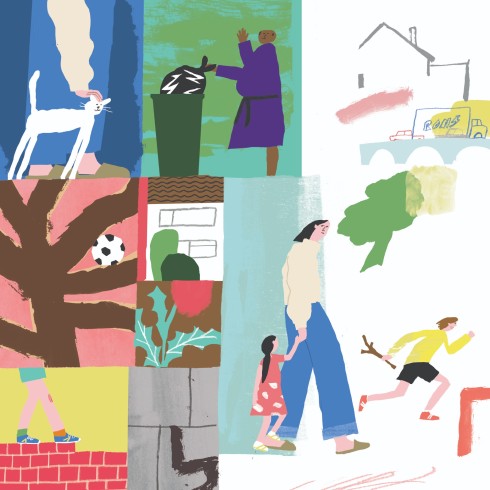What moving house does to your brain

How many times can you fall in a pothole? I have asked myself this question at least once a month for close to nine years now. Each time I haul another wailing child up from the very same patch of uneven pavement that their foot/scooter/bike wheel has collided with. Again.
How many times have we fallen in this specific pothole? A hundred? A thousand?
I’m not sure what neuroscience would say about the limited hazard recall of my children but as humans we develop mental maps of our immediate neighbourhood. We track our daily geographies, whether they encompass a single room or many miles. The trip to the coffee shop or the school gate, the office or the train station. My own commute is 6,400 intimately familiar steps — from my home, via the nursery and school, across the bridge — and on to FT HQ. I barely have to think about it. I just walk it.
But my family moves house later this summer and those daily steps are, literally, numbered. In many ways this is the most boring and undramatic of possible relocations: merely a couple of miles down the road. We are still in London, that famous city of villages, just skipping a couple of villages over. More space, good schools: the most easily mockable of clichés that nonetheless make up the decisions that chart many a life.
And yet, like all moves that go beyond “down the street”, it represents a complete redrawing of a mental and emotional map. A ground zero for brains and hearts.
A medical professional once told me that Alzheimer’s disease is often first diagnosed following a house move. When you are surrounded by the habits of home and daily routine, so much of what you do is on autopilot. You know where your keys go, where the post box is, how to navigate the door. Remove someone from these rhythms and the symptoms of mental deterioration can be starkly exposed, no longer masked by familiarities.
Even without a debilitating disease to contend with, moving to a new environment can rewire your brain. Confronted with novelty, different faculties are thrust to the fore. One UCL study published in the academic journal Cerebral Cortex suggested that it is the area of the retrosplenial cortex that operates as you move through a familiar space. But navigating new places requires you to use the hippocampus instead.
Outside of its comfort zone, your brain’s plasticity is challenged — in a good way. So are your preconceptions. Like all good city dwellers, life in one of the world’s greatest melting pots has only enhanced my parochialism. My grandmother regarded going south of the river as a sin. I hold similarly mad prejudices about, of all things, hospitals. I was born at St Thomas’s. My three children were born at St Thomas’s. What violence am I perpetrating on the next cycle of family life by moving us all to an area where the local hospital is . . . whisper it . . . not St Thomas’s?
It is perhaps fitting that two phrases that have literally nothing to do with south London whatsoever best describe my feelings about this new era. I’ve always loved the Welsh word hiraeth — one of those fabulously impossible-to-translate words that nonetheless contains a human universal. Namely, nostalgia and homesickness for a place that no longer exists. In other words, the very feeling my child is currently experiencing when she says “I want to go home”. She’s still in it but she knows that change is coming.
Then there is the evocative old Scots expression calf-grund. This is the place of your birth and early life. The territory on which you were calved and whose imprint remains, no matter where you go afterwards.
Describing anything about early parenthood as bovine is dangerous and yet incredibly accurate. It is the herding of my own calf-like progeny on the nursery run that has embedded itself most deeply in my neural pathways. For almost nine years, I have walked some part of that route on most days. First with one baby, then two, then three, then a puppy. We have dragged prams and steadied scooters and dealt with full-blown hysteria (mine, theirs, you name it). And, of course, fallen in potholes.
It is their calf-grund. It is part of my mental map. These streets have defined my life as a hassled mother pacing south London, on autopilot and on her own terrain. And although I will remain a hassled mother pacing some different streets in south London, they’re not hard-wired into me yet.
Alice Fishburn is the FT’s opinion and analysis editor
Find out about our latest stories first — follow @FTProperty on X or @ft_houseandhome on Instagram
This story originally appeared on: Financial Times - Author:Alice Fishburn
























